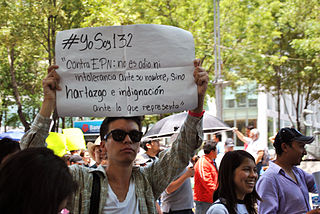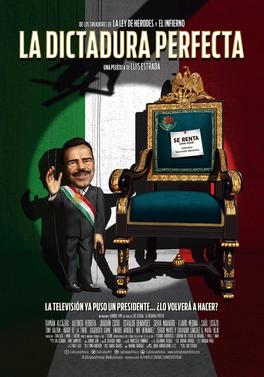
The National Autonomous University of Mexico is a public research university in Mexico. It is widely regarded as a top research university A portion of Ciudad Universitaria is a UNESCO World Heritage site that was designed and decorated by some of Mexico's best-known architects and painters of the 20th century. The campus also hosted the main events of the 1968 Summer Olympic Games. All Mexican Nobel laureates are alumni or faculty of UNAM. With acceptance rates usually below 10%, UNAM is known for its competitive admissions.

Rodolfo Stavenhagen was a German-born Mexican sociologist and anthropologist who specialized in the study of human rights and the political relations between indigenous peoples and states. He was a professor-researcher at El Colegio de México. In 2001 he was appointed by the United Nations Commission on Human Rights the first United Nations Special Rapporteur on the situation of the human rights and fundamental freedoms of indigenous people through Resolution 2001/57. His mandate expired 30 April 2008. He was succeeded by Prof S. James Anaya of the University of Arizona.
Emilio Carballido was a Mexican writer who earned particular renown as a playwright.

Columba Domínguez Alarid was a Mexican actress, singer, and painter. She is remembered particularly for her performance in the film Pueblerina (1949).

Yo Soy 132, commonly stylized as #YoSoy132, was a protest movement composed of Mexican university students from both private and public universities, residents of Mexico, claiming supporters from about 50 cities around the world. It began as opposition to the Institutional Revolutionary Party (PRI) candidate Enrique Peña Nieto and the Mexican media's allegedly biased coverage of the 2012 general election. The name Yo Soy 132, Spanish for "I Am 132", originated in an expression of solidarity with the original 131 protest's initiators. The phrase drew inspiration from the Occupy movement and the Spanish 15-M movement. The protest movement was known worldwide as the "Mexican spring" after claims made by its first spokespersons, and called the "Mexican occupy movement" in the international press.
The 2012–13 UNAM season was the 66th professional season of Mexico's top-flight football league. The season is split into two tournaments—the Torneo Apertura and the Torneo Clausura—each with identical formats and each contested by the same eighteen teams. UNAM began their season on July 21, 2012 against Atlas, UNAM played their homes games on Sundays at noon local time. UNAM did not reach the final phase in the Apertura tournament and were eliminated by América in the quarter-finals of the final phase in the Clausura tournament.

Véronique Azan was a French Kathak dancer known for beauty and grace. During her active years of dance, she traveled the world performing in various dance festivals.
Paulina Lavista is a Mexican photographer, noted for her controversial work which has tested the limits of the field. She is the daughter of a composer and a painter, beginning a career in modeling and cinema before moving into photographic work in the 1960s. She began with portrait work, with one of her first clients being longtime partner Salvador Elizondo, and later breaking into more artistic work with a series of nudes for the magazine Su Otro Yo. She has photographed many subjects from the Mexican art scene as well as images of people in every day activity, mostly in Mexico. She is a member of the Salón de la Plástica Mexicana.

The Perfect Dictatorship is a 2014 Mexican comedy political satire film, written, produced and directed by Luis Estrada and starring Damián Alcázar, Alfonso Herrera, Joaquín Cosío, Dagoberto Gama, María Rojo and Salvador Sánchez. Cast also includes Osvaldo Benavides, Saúl Lisazo, Tony Dalton, Arath de la Torre, Sergio Mayer and Itatí Cantoral. It was released on October 16, 2014, and represented Mexico at the 2015 Goya Awards.

Pablo Soler Frost is a Mexican novelist, essayist, translator, playwright, short-story and screen writer. A polyglot, he has translated into Spanish several works and poems by Shakespeare, Walpole, Walter Scott, Shelley, John Henry Newman, Joseph Conrad, Robert Frost, Rainer M. Rilke, Theodor Daübler and Joanna Walsh.

Gabino Palomares Gómez is a Mexican singer-songwriter and a social and political activist. He is one of the main exponents of the nueva canción movement in Latin America, and one of the founders of the canto nuevo movement in Mexico, alongside Amparo Ochoa, Óscar Chávez, and the group Los Folkloristas. He is the author of "La maldición de Malinche", one of the most prominent songs of the movement, and of more than a hundred songs covering social, political, and love themes.

Rubén Isaac Albarrán Ortega is a Mexican musician, singer, song writer, music producer, and activist. He is a member and founder of the alternative rock band Café Tacvba. As singer and frontman of Café Tacvba, the artist has characterized himself by his energetic attitude onstage and for presenting himself as different characters and aliases throughout his career.
Sofía Cancino de Cuevas was a Mexican composer, pianist, opera promoter, singer, and her country's first woman symphonic conductor.

Héctor Ortega Gómez was a Mexican film, television, and theater actor. He was also a screenwriter and a director.

Rita Guerrero was a Mexican artist active in various fields, mainly music and theater. She was vocalist of the rock band Santa Sabina, of which she was the most visible figure. After leaving the group, she was part of Ensamble Galileo, a project dedicated to the interpretation of Baroque music. Guerrero also hosted some television programs and supported various social movements in Mexico, such as the Zapatista Army of National Liberation and the country's electoral left.

Hugo López-Gatell is a Mexican epidemiologist, author, and public health official who has served as head of the Undersecretariat of Prevention and Health Promotion at the Mexican Secretariat of Health since 2018. Since January 2020, he has also been the spokesman and one of the lead members of the federal governments response to the COVID-19 pandemic in Mexico.
This article lists events occurring in Mexico during the year 2021. The article lists the most important political leaders during the year at both federal and state levels and will include a brief year-end summary of major social and economic issues. Cultural events, including major sporting events, are also listed. For a more expansive list of political events, see 2021 in Mexican politics and government.

Pura López Colomé is a Mexican poet and translator. She has contributed to various magazines and cultural supplements with poetry, essays, and translations of poetry and prose from English into Spanish. Her awards include the Alfonso Reyes National Essay Award, the National Poetry Translation Prize, and the Xavier Villaurrutia Prize.

Paté de Fuá is a musical group whose style can be defined as a mixture of tarantella, dixieland, musette, tango and jazz. It is a group born in Mexico City and is integrated by musicians from different countries, currently with members from Mexico, Argentina and Israel.














